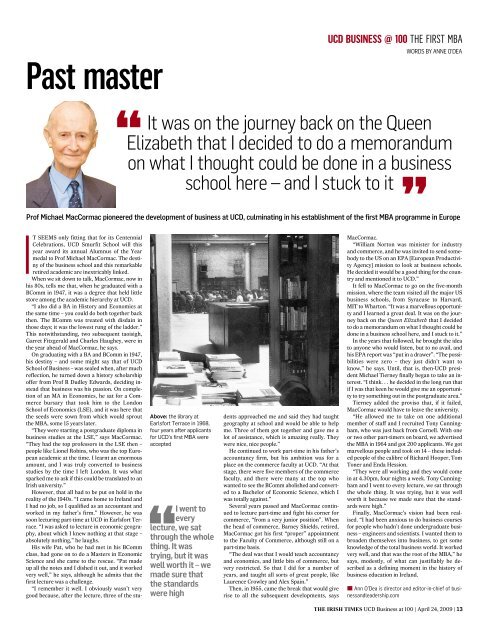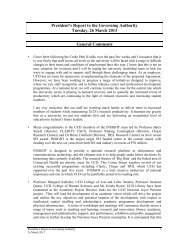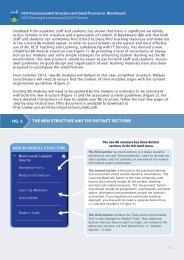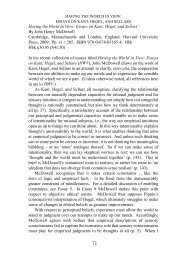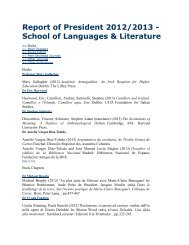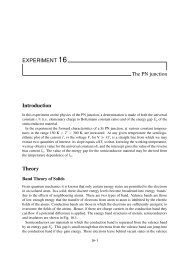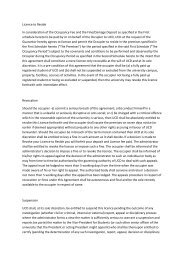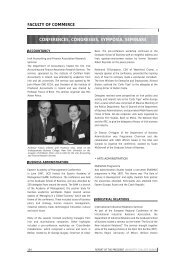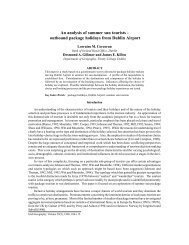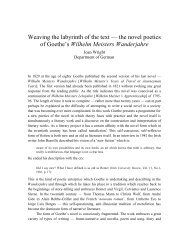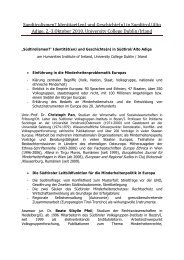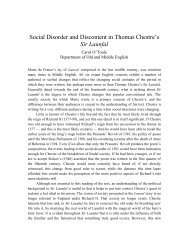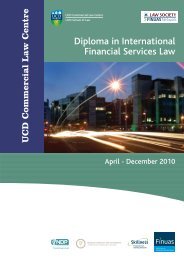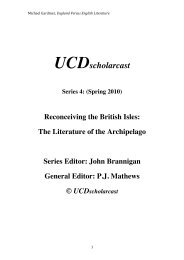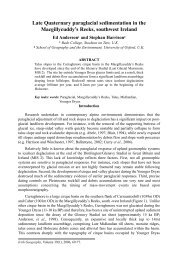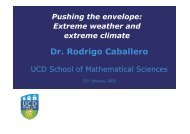UCD Business at 100 - University College Dublin
UCD Business at 100 - University College Dublin
UCD Business at 100 - University College Dublin
You also want an ePaper? Increase the reach of your titles
YUMPU automatically turns print PDFs into web optimized ePapers that Google loves.
Past master<br />
IT SEEMS only fitting th<strong>at</strong> for its Centennial<br />
Celebr<strong>at</strong>ions, <strong>UCD</strong> Smurfit School will this<br />
year award its annual Alumnus of the Year<br />
medal to Prof Michael MacCormac. The destiny<br />
of the business school and this remarkable<br />
retired academic are inextricably linked.<br />
When we sit down to talk, MacCormac, now in<br />
his 80s, tells me th<strong>at</strong>, when he gradu<strong>at</strong>ed with a<br />
BComm in 1947, it was adegree th<strong>at</strong> held little<br />
store among the academic hierarchy <strong>at</strong> <strong>UCD</strong>.<br />
“I also did aBAinHistory and Economics <strong>at</strong><br />
the same time –you could do both together back<br />
then. The BComm was tre<strong>at</strong>ed with disdain in<br />
those days; it was the lowest rung of the ladder.”<br />
This notwithstanding, two subsequent taoisigh,<br />
Garret Fitzgerald and Charles Haughey, were in<br />
the year ahead of MacCormac, he says.<br />
On gradu<strong>at</strong>ing with aBAand BComm in 1947,<br />
his destiny –and some might say th<strong>at</strong> of <strong>UCD</strong><br />
School of <strong>Business</strong> –was sealed when, after much<br />
reflection, he turned down ahistory scholarship<br />
offer from Prof RDudley Edwards, deciding instead<br />
th<strong>at</strong> business was his passion. On completion<br />
of an MA in Economics, he s<strong>at</strong> for aCommerce<br />
bursary th<strong>at</strong> took him to the London<br />
School of Economics (LSE), and it was here th<strong>at</strong><br />
the seeds were sown from which would sprout<br />
the MBA, some 15 years l<strong>at</strong>er.<br />
“They were starting apostgradu<strong>at</strong>e diploma in<br />
business studies <strong>at</strong> the LSE,” says MacCormac.<br />
“They had the top professors in the LSE then –<br />
people like Lionel Robins, who was the top European<br />
academic <strong>at</strong> the time. Ilearnt an enormous<br />
amount, and Iwas truly converted to business<br />
studies by the time Ileft London. It was wh<strong>at</strong><br />
sparked me to ask if this could be transl<strong>at</strong>ed to an<br />
Irish university.”<br />
However, th<strong>at</strong> all had to be put on hold in the<br />
reality of the 1940s. “I came home to Ireland and<br />
Ihad no job, so Iqualified as an accountant and<br />
worked in my f<strong>at</strong>her’s firm.” However, he was<br />
soon lecturing part-time <strong>at</strong> <strong>UCD</strong> in Earlsfort Terrace.<br />
“I was asked to lecture in economic geography,<br />
about which Iknew nothing <strong>at</strong> th<strong>at</strong> stage –<br />
absolutely nothing,” he laughs.<br />
His wife P<strong>at</strong>, who he had met in his BComm<br />
class, had gone on to do aMasters in Economic<br />
Science and she came to the rescue. “P<strong>at</strong> made<br />
up all the notes and Idished it out, and it worked<br />
very well,” he says, although he admits th<strong>at</strong> the<br />
first lecture was achallenge.<br />
“I remember it well. Iobviously wasn’t very<br />
good because, after the lecture, three of the stu-<br />
Above: the library <strong>at</strong><br />
Earlsfort Terrace in 1968,<br />
four years after applicants<br />
for <strong>UCD</strong>’s first MBA were<br />
accepted<br />
“Iwent to<br />
every<br />
lecture, we s<strong>at</strong><br />
through the whole<br />
thing. It was<br />
trying, but it was<br />
well worth it –we<br />
made sure th<strong>at</strong><br />
the standards<br />
were high<br />
dents approached me and said they had taught<br />
geography <strong>at</strong> school and would be able to help<br />
me. Three of them got together and gave me a<br />
lot of assistance, which is amazing really. They<br />
were nice, nice people.”<br />
He continued to work part-time in his f<strong>at</strong>her’s<br />
accountancy firm, but his ambition was for a<br />
place on the commerce faculty <strong>at</strong> <strong>UCD</strong>. “At th<strong>at</strong><br />
stage, there were five members of the commerce<br />
faculty, and there were many <strong>at</strong> the top who<br />
wanted to see the BComm abolished and converted<br />
to aBachelor of Economic Science, which I<br />
was totally against.”<br />
Several years passed and MacCormac continued<br />
to lecture part-time and fight his corner for<br />
commerce, “from avery junior position”. When<br />
the head of commerce, Barney Shields, retired,<br />
MacCormac got his first “proper” appointment<br />
to the Faculty ofCommerce, although still on a<br />
part-time basis.<br />
“The deal was th<strong>at</strong> Iwould teach accountancy<br />
and economics, and little bits of commerce, but<br />
very restricted. So th<strong>at</strong> I did for a number of<br />
years, and taught all sorts of gre<strong>at</strong> people, like<br />
Laurence Crowley and Alex Spain.”<br />
Then, in 1955, came the break th<strong>at</strong> would give<br />
rise to all the subsequent developments, says<br />
<strong>UCD</strong> BUSINESS @<strong>100</strong> THE FIRST MBA<br />
WORDS BY ANNE O’DEA<br />
“ It was on the journey back on the Queen<br />
Elizabeth th<strong>at</strong> Idecided to do amemorandum<br />
on wh<strong>at</strong> Ithought could be done in abusiness<br />
school here –and Istuck to it<br />
”<br />
Prof Michael MacCormac pioneered the development of business <strong>at</strong> <strong>UCD</strong>, culmin<strong>at</strong>ing in his establishment of the first MBA programme in Europe<br />
MacCormac.<br />
“William Norton was minister for industry<br />
and commerce, and he was invited to send somebody<br />
to the US on an EPA [European Productivity<br />
Agency] mission to look <strong>at</strong> business schools.<br />
He decided it would be agood thing for the country<br />
and mentioned it to <strong>UCD</strong>.”<br />
It fell to MacCormac to go on the five-month<br />
mission, where the team visited all the major US<br />
business schools, from Syracuse to Harvard,<br />
MIT to Wharton. “It was amarvellous opportunity<br />
and Ilearned agre<strong>at</strong> deal. It was on the journey<br />
back on the Queen Elizabeth th<strong>at</strong> Idecided<br />
to do amemorandum on wh<strong>at</strong> Ithought could be<br />
done in abusiness school here, and Istuck to it.”<br />
In the years th<strong>at</strong> followed, he brought the idea<br />
to anyone who would listen, but to no avail, and<br />
his EPA report was “put in adrawer”. “The possibilities<br />
were zero – they just didn’t want to<br />
know,” he says. Until, th<strong>at</strong> is, then-<strong>UCD</strong> president<br />
Michael Tierney finally began to take an interest.<br />
“Ithink. ..hedecided in the long run th<strong>at</strong><br />
if Iwas th<strong>at</strong> keen he would give me an opportunity<br />
to try something out in the postgradu<strong>at</strong>e area.”<br />
Tierney added the proviso th<strong>at</strong>, if it failed,<br />
MacCormac would have to leave the university.<br />
“He allowed me to take on one additional<br />
member of staff and Irecruited Tony Cunningham,<br />
who was just back from Cornell. With one<br />
or two other part-timers on board, we advertised<br />
the MBA in 1964 and got 200 applicants. We got<br />
marvellous people and took on 14 –these included<br />
people of the calibre of Richard Hooper, Tom<br />
Toner and Enda Hession.<br />
“They were all working and they would come<br />
in <strong>at</strong> 4.30pm, four nights aweek. Tony Cunningham<br />
and Iwent to every lecture, we s<strong>at</strong> through<br />
the whole thing. It was trying, but it was well<br />
worth it because we made sure th<strong>at</strong> the standards<br />
were high.”<br />
Finally, MacCormac’s vision had been realised.<br />
“I had been anxious to do business courses<br />
for people who hadn’t done undergradu<strong>at</strong>e business<br />
–engineers and scientists. Iwanted them to<br />
broaden themselves into business, to get some<br />
knowledge of the total business world. It worked<br />
very well, and th<strong>at</strong> was the root of the MBA,” he<br />
says, modestly, of wh<strong>at</strong> can justifiably be described<br />
as adefining moment in the history of<br />
business educ<strong>at</strong>ion in Ireland.<br />
■ Ann O’Dea is director and editor-in-chief of businessandleadership.com<br />
THE IRISH TIMES <strong>UCD</strong> <strong>Business</strong> <strong>at</strong> <strong>100</strong> |April 24, 2009 | 13


